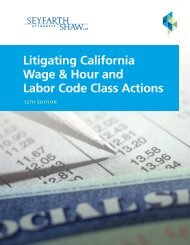Massachusetts Employment & Labor Law Report - Seyfarth Shaw LLP
Massachusetts Employment & Labor Law Report - Seyfarth Shaw LLP
Massachusetts Employment & Labor Law Report - Seyfarth Shaw LLP
You also want an ePaper? Increase the reach of your titles
YUMPU automatically turns print PDFs into web optimized ePapers that Google loves.
Despite Supreme Court<br />
Ruling, <strong>Massachusetts</strong><br />
Court Invalidates<br />
Class Action Waiver in<br />
Arbitration Agreement<br />
A Superior Court judge recently invalidated a class<br />
action waiver in an arbitration agreement under state<br />
law, even though in April 2011 the U.S. Supreme Court<br />
held that federal law preempts state laws that interfere<br />
with a company’s ability to enforce class action waivers<br />
in arbitration agreements. This ruling shows that<br />
<strong>Massachusetts</strong> courts may still find class action waivers in<br />
arbitration agreements unenforceable, particularly where the<br />
waivers are not carefully drafted or where small claims are at<br />
stake.<br />
In Feeney v. Dell, Inc., two plaintiffs sought to bring a<br />
consumer class action against Dell arising out of Dell’s<br />
collection of sales tax on their computer service contracts.<br />
Their claims were both worth less than $250. Their contracts<br />
with Dell required arbitration, prohibited class actions, and<br />
did not allow consumers to be awarded anything more than<br />
the value of their claims.<br />
In 2009, the <strong>Massachusetts</strong> Supreme Judicial Court (SJC)<br />
invalidated Dell’s class action waivers. The SJC ruled that,<br />
given the small claims at stake, a class action was the only<br />
realistic option for consumers to pursue their claims against<br />
Dell. Accordingly, the SJC held, the waivers were contrary to<br />
public policy and unenforceable.<br />
After the SJC’s ruling, the Supreme Court ruled in AT&T<br />
Mobility LLC v. Concepcion that the Federal Arbitration Act<br />
(FAA) preempted a California rule that banned class action<br />
waivers in certain consumer arbitration agreements. The<br />
Supreme Court found that the California rule required<br />
companies with certain arbitration agreements to allow<br />
class-wide arbitration, even though class actions are less<br />
efficient than individual arbitrations. The Supreme Court<br />
decided that the California rule thus frustrated the ability<br />
to resolve disputes efficiently, thereby interfering with one<br />
of the FAA’s purposes. However, the Supreme Court also<br />
added that the claim before it was likely to be prosecuted<br />
on an individual basis because the company agreed to pay<br />
claimants at least $7,500 and twice their attorneys’ fees<br />
if they obtained an arbitration award greater than the<br />
company’s last settlement offer.<br />
After Concepcion, Dell argued in the Superior Court that<br />
the SJC’s earlier ruling was no longer valid because, similar<br />
to the California rule invalidated in Concepcion, the SJC<br />
required Dell to allow consumers to pursue their claims<br />
through class actions notwithstanding the language of the<br />
arbitration agreements, thereby frustrating the purpose of<br />
the FAA. The Superior Court rejected Dell’s argument and<br />
found that, unlike the arbitration provision in Concepcion,<br />
Dell’s provision did not include features that would make<br />
individual-based arbitration of small claims feasible. The<br />
Superior Court concluded that the SJC’s ruling did not<br />
frustrate the FAA because individual-based arbitration was<br />
not a realistic option for Dell’s consumers. The Superior<br />
Court added that it would have upheld Dell’s class action<br />
waiver if Dell had made individual-based claims feasible, such<br />
as through incorporating a minimum recovery provision.<br />
Employers who have or are considering arbitration class<br />
action waivers should be aware of Feeney because it shows<br />
that, regardless of Concepcion, courts may still invalidate<br />
such waivers, particularly where small-dollar claims are<br />
involved as may be the case in wage and hour disputes. To<br />
avoid invalidation, employers may want to consider including<br />
provisions in their waivers that make individual-based<br />
arbitrations feasible for small-dollar claims.<br />
First Circuit Rules<br />
that Interviewing an<br />
Applicant Is Not an<br />
Admission that the<br />
Applicant Is Qualified for<br />
the Position<br />
In Goncalves v. Plymouth County Sheriff’s Dep’t, the U.S.<br />
Court of Appeals for the First Circuit held that allowing an<br />
applicant to proceed through the stages of a hiring process<br />
is not an admission that the applicant was qualified for the<br />
position or similarly situated to other applicants for purposes<br />
of state and federal anti-discrimination laws.<br />
Plaintiff Joy Goncalves was a 49 year old Cape Verdean<br />
woman who worked for the Plymouth County Sheriff’s<br />
Department and had applied for a promotion to two<br />
different information technology (IT) positions. Both<br />
positions called for an associate’s degree in a computerrelated<br />
field, at least three years of relevant work experience,<br />
and three or more years of experience using certain<br />
<strong>Seyfarth</strong> <strong>Shaw</strong> — <strong>Massachusetts</strong> <strong>Employment</strong> & <strong>Labor</strong> <strong>Law</strong> <strong>Report</strong> - December 2011
















